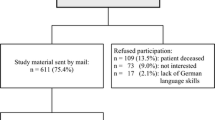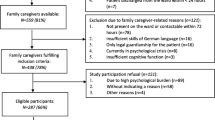Abstract
Background
We sought to determine mutuality and specificity in rates of mental disorders between advanced cancer patients and their caregivers.
Method
Data from 168 non-genetically related patient–caregiver dyads participating in the multi-site Coping with Cancer (CWC) study were included in this analysis. Multivariate logistic regression analyses were conducted to examine associations between diagnoses of a psychiatric disorder in patients with diagnoses of psychiatric disorders in caregivers, and vice versa, controlling for confounders.
Results
When patients met criteria for any psychiatric diagnosis, then caregivers were 7.9 times (P < 0.0001) more likely to meet criteria for any psychiatric diagnosis, and vice versa. Caregiver Panic Disorder (PD) diagnosis was associated with patient Generalized Anxiety Disorder (GAD). Patient GAD was also associated with caregiver PD. Finally, patient PD was associated with caregiver GAD and caregiver Post-Traumatic Stress Disorder (PTSD).
Conclusions
To our knowledge, this is the first study that demonstrates the mutuality of psychiatric disorders in both advanced cancer patients and their informal caregivers. Specifically, the presence of anxiety disorders in one partner (either caregiver or patient) was associated with a greater likelihood of anxiety disorders in the other. Results suggest that psychiatric distress should be assessed in both patients and their caregivers, and that mental illness in one should raise concern about the possibility of a psychiatric disorder in the other. Results also suggest that targeted interventions to address shared fears and concerns of patients and caregivers might reduce anxiety in the end phases of the patient’s illness.
Similar content being viewed by others
References
The SUPPORT Principal Investigators (1995) A controlled trial to improve care for seriously ill hospitalized patients. The study to understand prognoses and preferences for outcomes and risks of treatments (SUPPORT). JAMA 274:1591–1598
Schulz R, Beach SR (1999) Caregiving as a risk factor for mortality: the Caregiver Health Effects Study. JAMA 282:2215–2219
Schulz R, Mendelsohn AB, Haley WE, Mahoney D, Allen RS, Zhang S, Thompson L, Belle SH (2003) End-of-life care and the effects of bereavement on family caregivers of persons with dementia. N Engl J Med 349:1936–1942
Prigerson HG, Jacobs SC (2001) Perspectives on care at the close of life. Caring for bereaved patients: “all the doctors just suddenly go”. JAMA 286:1369–1376
Valdimarsdottir U, Helgason AR, Furst CJ, Adolfsson J, Steineck G (2002) The unrecognised cost of cancer patients’ unrelieved symptoms: a nationwide follow-up of their surviving partners. Br J Cancer 86:1540–1545
Nijboer C, Triemstra M, Tempelaar R, Sanderman R, van den Bos GA (1999) Determinants of caregiving experiences and mental health of partners of cancer patients. Cancer 86:577–588
Nijboer C, Tempelaar R, Sanderman R, Triemstra M, Spruijt RJ, van den Bos GA (1998) Cancer and caregiving: the impact on the caregiver’s health. Psychooncology 7:3–13
Pitceathly C, Maguire P (2003) The psychological impact of cancer on patients’ partners and other key relatives: a review. Eur J Cancer 39:1517–1524
Kurtz ME, Kurtz JC, Given CW, Given B (1995) Relationship of caregiver reactions and depression to cancer patients’ symptoms, functional states and depression—a longitudinal view. Soc Sci Med 40:837–846
Kornblith AB, Herr HW, Ofman US, Scher HI, Holland JC (1994) Quality of life of patients with prostate cancer and their spouses. The value of a data base in clinical care. Cancer 73:2791–2802
Maly RC, Umezawa Y, Leake B, Silliman RA (2005) Mental health outcomes in older women with breast cancer: impact of perceived family support and adjustment. Psychooncology 14:535–545
Mosher CE, Danoff-Burg S (2005) Psychosocial impact of parental cancer in adulthood: a conceptual and empirical review. Clin Psychol Rev 25:365–382
Peters L, Sellick K (2006) Quality of life of cancer patients receiving inpatient and home-based palliative care. J Adv Nurs 53:524–533
Kadan-Lottick NS, Vanderwerker LC, Block SD, Zhang B, Prigerson HG (2005) Psychiatric disorders and mental health service use in patients with advanced cancer: a report from the Coping with Cancer Study. Cancer 104:2872–2881
Vanderwerker LC, Laff RE, Kadan-Lottick NS, McColl S, Prigerson HG (2005) Psychiatric disorders and mental health service use among caregivers of advanced cancer patients. J Clin Oncol 23:6899–6907
First M, Spitzer RL, Gibbon M, Williams JBW (1995) Structured clinical interview for the DSM-IV axis I disorders—patient edition (SCID-I/P, Version 2.0). Research Department, New York State Psychiatric Institute
Williams JB, Gibbon M, First MB, Spitzer RL, Davies M, Borus J, Howes MJ, Kane J, Pope HG Jr, Rounsaville B, et al. (1992) The structured clinical interview for DSM-III-R (SCID). II. Multisite test-retest reliability. Arch Gen Psychiatry 49:630–636
Heinze G, Schemper M (2002) A solution to the problem of separation in logistic regression. Stat Med 21:2409–2419
Sullivan HS (1953) The interpersonal theory of psychiatry. W. W. Norton and Company, Inc., New York, NY
Acknowledgments
This research was supported in part by the following grants National Institute of Aging (NIA)—funded Harvard Initiative in Global Health pilot grant (KZB, HGP) and MH56529 and MH63892 from the National Institute of Mental Health (HGP) and CA106370 from the National Cancer Institute (HGP).
Author information
Authors and Affiliations
Corresponding author
Rights and permissions
About this article
Cite this article
Bambauer, K.Z., Zhang, B., Maciejewski, P.K. et al. Mutuality and specificity of mental disorders in advanced cancer patients and caregivers. Soc Psychiat Epidemiol 41, 819–824 (2006). https://doi.org/10.1007/s00127-006-0103-x
Accepted:
Published:
Issue Date:
DOI: https://doi.org/10.1007/s00127-006-0103-x




